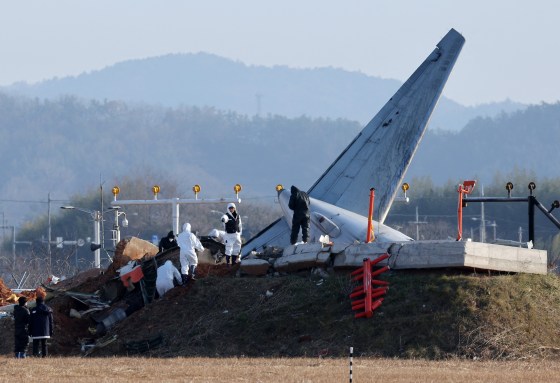By Adeyemi Adekunle
On New Year’s Day, a day meant for joy and reflection, South Korea grappled with heartbreak as the aftermath of its deadliest aviation disaster in years continued to unfold.
The crash of Jeju Air Flight 2216 on Sunday has left a nation in mourning, as families bury their loved ones and investigators sift through clues to understand what went so devastatingly wrong.
The Boeing 737-800, carrying 181 passengers and crew, crashed while attempting to land at Muan International Airport in southwestern South Korea. Of those on board, 179 perished, leaving only two survivors, both cabin crew members stationed at the tail of the aircraft.
The survivors are now vital witnesses in what has become a sprawling international investigation involving South Korean authorities and a U.S. team that includes representatives from the Federal Aviation Administration, the National Transportation Safety Board, and Boeing.
Central to this investigation are the plane’s black boxes: the flight data recorder and the cockpit voice recorder. These devices are crucial in piecing together the events leading up to the crash. While the cockpit voice recorder has been retrieved and is being converted into audio files, the flight data recorder suffered damage that prevents analysis in South Korea.
It has been sent to the United States for further examination, a process that investigators hope will yield answers to the many questions surrounding the tragedy.
In a country already reeling from political instability, the crash has added another layer of national anguish. Acting President Choi Sang-mok, who took office just days before the disaster following the impeachment of his predecessor, used his New Year’s address to express solidarity with the victims’ families.
“Today is New Year’s Day, a day meant to be spent with family, which makes the sorrow even greater,” he said. “I offer my prayers for the souls of the victims and extend my deepest condolences once again to the bereaved families who have lost their loved ones.”
Choi also assured the public that every effort was being made to uncover the truth behind the crash. He mentioned the potential causes being examined, including a bird strike, issues with the landing gear deployment, or other mechanical failures.
However, he cautioned that the final conclusion would only come after a thorough analysis of the black box data and other factors.
For the families of the victims, the pain of this tragedy is compounded by the timing. As the nation rang in the new year, many found themselves planning funerals instead of celebrations.
By Wednesday, officials had identified all 179 victims, with 11 bodies returned to their families. Memorial ceremonies have begun, including a poignant gathering at the crash site where bereaved families paid their respects.
Jeju Air, the airline operating the ill-fated flight, has pledged to cover funeral expenses and provide financial assistance to affected families. Chief Executive Kim E-Bae expressed the company’s condolences, promising steps to enhance safety.
“We will enhance pre- and post-flight inspections, monitor weather conditions more rigorously, and pay close attention to the emotional well-being of our aviation personnel,” he said. The airline has also reduced its winter operations by 15% to prioritize safety.
The crash occurred during an attempted landing without the plane’s landing gear deployed. The aircraft burst into flames after colliding with an embankment at the end of the runway.
Investigators are exploring why the landing gear failed to engage and whether pilot error, mechanical malfunction, or external factors like weather conditions played a role. The possibility of a bird strike is also being examined, as such incidents can cause catastrophic damage to an aircraft’s engines or other critical systems.
The human stories emerging from the tragedy are gut-wrenching. Families are mourning multiple members lost in an instant, while others are left grappling with the unimaginable reality of their loved ones’ final moments.
The two surviving cabin crew members, both of whom were in the rear of the plane, are reportedly cooperating with investigators as they try to piece together the events leading up to the crash. Their accounts, combined with data from the black boxes, could provide the vital clues needed to uncover the truth.
This disaster has sent shockwaves beyond South Korea, drawing international attention and solidarity. The involvement of U.S. investigators highlights the global significance of aviation safety and the collaborative effort required to prevent similar tragedies.
The Boeing 737-800, a widely used aircraft model, has a strong safety record, making this incident even more alarming for the aviation industry. Any findings that point to systemic issues could prompt changes in safety protocols or aircraft design.
For now, the nation waits, caught between grief and the hope for answers. As the investigation continues, South Koreans are coming together to support the families of the victims and honor the memories of those lost.
The sight of families at the crash site, holding memorial ceremonies in the shadow of unimaginable loss, is a sobering reminder of the human cost of such tragedies.
The crash of Jeju Air Flight 2216 is more than a national disaster—it is a stark reminder of the fragility of life and the importance of vigilance in ensuring safety.
As the black box data is analyzed and investigators delve deeper into the cause, the world watches, hoping that the lessons learned will prevent such heartbreak in the future. In the meantime, South Korea mourns, united in grief and the determination to find answers.




